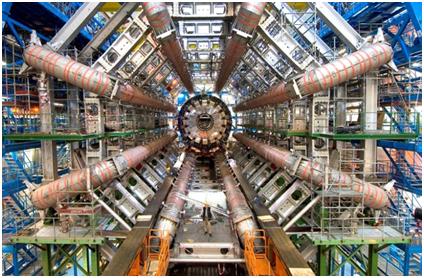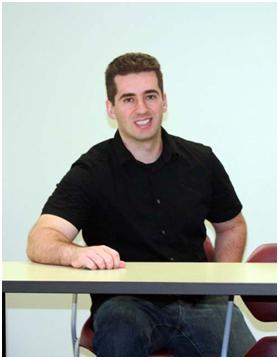 Early this morning Large Hadron Collider became operational at CERN in Switzerland. The run this morning was the test of the basic operation of the collider, with the real science part of the experiment to start in about a month. The collider will be operating at energies much higher than any previously achieved and promises to shed light on some very deep mysteries of Physics. However, the run-up to the experiment has been marred with a lot of controversy. Because the energy levels that the protons at LHC will be achieving have last been achieved at Big Bang, the whole endeavor came to be known as "Big Bang experiment." The whole connotation of that is quite ominous, and many people were quite concerned about what sort of catastrophe we may experience. To top it all, there have also been suggestions that the experiment would create tiny black holes that could quickly swallow up the Earth. None of this, I am happy to report, happened.
Early this morning Large Hadron Collider became operational at CERN in Switzerland. The run this morning was the test of the basic operation of the collider, with the real science part of the experiment to start in about a month. The collider will be operating at energies much higher than any previously achieved and promises to shed light on some very deep mysteries of Physics. However, the run-up to the experiment has been marred with a lot of controversy. Because the energy levels that the protons at LHC will be achieving have last been achieved at Big Bang, the whole endeavor came to be known as "Big Bang experiment." The whole connotation of that is quite ominous, and many people were quite concerned about what sort of catastrophe we may experience. To top it all, there have also been suggestions that the experiment would create tiny black holes that could quickly swallow up the Earth. None of this, I am happy to report, happened.
One of the interesting things to me is that most of the reports of the opposition to the experiment came from the pseudo-intellectual secularist quacks. Religious groups and individuals for most part either did not care about the hype or were hoping that the experiment may precipitate the end of the World and bring forth salvation for the right believers. In this matter at least, it was the loony atheists who were mostly "against science."
As a high energy Physicist (at least that's who I am most easily lumped with) I am really excited about this experiment. The whole field of particle and field theory Physics has laid fallow for many decades, and all the glittering ultra-(post)modern-theories have not penned out to bring us any closer to the fuller understanding of the fundamental laws of nature. LHC is bound to shake things up a bit. One of the hoped discoveries would be a Higgs boson, a particle that supposedly gives mass to all other particles. I have my doubts about this. I think that the Higgs mechanism is just an inelegant patchwork that helped us make the sense of the Standard Model, but it ultimately only amounts to exchanging one kind of unknowns for another. Hence, I am skeptical that Higgs bosons will be discovered as actual physical particles.
Even more exotic hoped for discoveries are super symmetry and extra dimensions. Both of these concepts came out of the attempts to go beyond the Standard Model, and neither one of them has had any shred of the evidence from the actual experiments. IMHO, the theories based on these two are also extremely ugly and unwieldy. My biggest hope is that the non-discovery of either one of the aforementioned effects and maybe the discovery of something completely unpredicted, would shake up the way that things are done in theoretical physics. It is high time to show, once and for all, that the emperor is not only naked, but stark raving mad.
 I finally got my McCain/Palin yard sign. As most of you know I am really into politics, and like to follow and be informed about the current events as much as possible. Unfortunately, not being a US citizen I am unable to actively participate in elections, nor even give campaign contributions to the candidates that I support. So I have rather limited options in making my political views known and make an influence on others. This year I was finally able to acquire a campaign yard sign, and in this small way I hope to express my support and solidarity with that presidential ticket.
I finally got my McCain/Palin yard sign. As most of you know I am really into politics, and like to follow and be informed about the current events as much as possible. Unfortunately, not being a US citizen I am unable to actively participate in elections, nor even give campaign contributions to the candidates that I support. So I have rather limited options in making my political views known and make an influence on others. This year I was finally able to acquire a campaign yard sign, and in this small way I hope to express my support and solidarity with that presidential ticket.  One of the advantages of living in a college town is the opportunity of go to a talk by a distinguished or famous personality. More often than not, these talks and invited speakers are from a very left part of the spectrum, but it is nonetheless interesting to find out what these people have to say. If nothing else, it's good to know what your enemies are thinking. This past week I went to a couple of talks that were part of
One of the advantages of living in a college town is the opportunity of go to a talk by a distinguished or famous personality. More often than not, these talks and invited speakers are from a very left part of the spectrum, but it is nonetheless interesting to find out what these people have to say. If nothing else, it's good to know what your enemies are thinking. This past week I went to a couple of talks that were part of  Early this morning
Early this morning  Many, many years ago, when I was applying to colleges in the US one thing I knew was that I really wanted to study Physics, and hence I mostly applied to places with really strong Physics departments. At the time I was living in Rhode Island as an exchange student in high school, and was able to visit several of these really good research institutions on the East Coast. The only place that was not on the East Coast that I applied to was Stanford, and at the time there was not much of a chance of me visiting it. So when I got accepted there I was a bit unprepared and did not know much about the place. In fact, the only two things that I knew for sure were that it was in California and that it had
Many, many years ago, when I was applying to colleges in the US one thing I knew was that I really wanted to study Physics, and hence I mostly applied to places with really strong Physics departments. At the time I was living in Rhode Island as an exchange student in high school, and was able to visit several of these really good research institutions on the East Coast. The only place that was not on the East Coast that I applied to was Stanford, and at the time there was not much of a chance of me visiting it. So when I got accepted there I was a bit unprepared and did not know much about the place. In fact, the only two things that I knew for sure were that it was in California and that it had  This past week has been my first full week of teaching at Wabash. So far it has been an overwhelmingly positive experience and I enjoy my new job a lot. Many people don't know this, and I delight in telling them, but Wabash is one of two or three remaining all-male colleges in the United States. Wabash is a place where word tradition has a lot of weight, and not going coeducational has been one of their salient points. For people for whom the whole concept of tradition is an anathema, this attitude can be very alien, but I personally don't have an issue with that. Initially it was a bit weird to walk into a large classroom filled exclusively with young men, but after only a short while you stop thinking about that. Students are just students, and your primary goal as a professor is to educate them to the best of your abilities, and under those circumstances the issues of sex, race and other demographical indicators quickly fade into the background.
This past week has been my first full week of teaching at Wabash. So far it has been an overwhelmingly positive experience and I enjoy my new job a lot. Many people don't know this, and I delight in telling them, but Wabash is one of two or three remaining all-male colleges in the United States. Wabash is a place where word tradition has a lot of weight, and not going coeducational has been one of their salient points. For people for whom the whole concept of tradition is an anathema, this attitude can be very alien, but I personally don't have an issue with that. Initially it was a bit weird to walk into a large classroom filled exclusively with young men, but after only a short while you stop thinking about that. Students are just students, and your primary goal as a professor is to educate them to the best of your abilities, and under those circumstances the issues of sex, race and other demographical indicators quickly fade into the background.